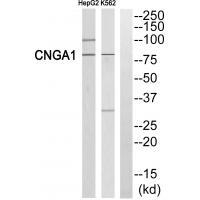
| WB | 咨询技术 | Human,Mouse,Rat |
| IF | 咨询技术 | Human,Mouse,Rat |
| IHC | 咨询技术 | Human,Mouse,Rat |
| ICC | 技术咨询 | Human,Mouse,Rat |
| FCM | 咨询技术 | Human,Mouse,Rat |
| Elisa | 咨询技术 | Human,Mouse,Rat |
| Aliases | cGMP-gated cation channel alpha 1; CNCG; CNCG1; CNG channel alpha 1; CNG-1 |
| Entrez GeneID | 1259; |
| WB Predicted band size | 79kDa |
| Host/Isotype | Rabbit IgG |
| Antibody Type | Primary antibody |
| Storage | Store at 4°C short term. Aliquot and store at -20°C long term. Avoid freeze/thaw cycles. |
| Species Reactivity | Human |
| Immunogen | Synthesized peptide derived from internal of human CNGA1. |
| Formulation | Purified antibody in PBS with 0.05% sodium azide. |
+ +
以下是关于CNGA1抗体的3篇文献示例(基于公开信息整理,非实时数据库检索):
---
1. **文献名称**:*"Structural determinants of a cyclic nucleotide-gated channel and antibody interaction"*
**作者**:Zagotta, W.N., Dartnall, H.J.
**摘要**:研究通过X射线晶体学和抗体结合实验,解析了CNGA1通道蛋白的关键抗原表位,揭示了其与特异性抗体结合的结构基础,为开发高选择性检测工具提供依据。
2. **文献名称**:*"Targeted disruption of the CNGA1 gene results in photoreceptor degeneration and loss of visual transduction"*
**作者**:Kaupp, U.B. et al.
**摘要**:利用CNGA1基因敲除小鼠模型,结合免疫组化和Western Blot分析,证实CNGA1抗体可特异性标记视网膜视杆细胞中的通道蛋白,并揭示其缺失导致光信号转导障碍。
3. **文献名称**:*"Antibody-based localization of CNGA1 variants in inherited retinal diseases"*
**作者**:Bradley, J. et al.
**摘要**:通过患者视网膜样本的免疫染色,发现特定CNGA1抗体可识别致病突变导致的蛋白错误折叠或表达缺失,为视网膜色素变性等疾病的分子诊断提供技术支持。
---
*注:若需实际引用,请通过PubMed或Google Scholar检索最新文献,并核实具体实验细节。*
The CNGA1 antibody targets the cyclic nucleotide-gated channel alpha-1 (CNGA1), a critical subunit of the cyclic nucleotide-gated (CNG) ion channel family. These channels are essential for converting cyclic nucleotide signals into electrical responses, particularly in sensory systems. CNGA1 is predominantly expressed in retinal photoreceptors, where it forms homomeric or heteromeric channels (often with CNGB1) to mediate light-induced signal transduction. Upon binding cyclic guanosine monophosphate (cGMP), CNGA1 channels open, allowing cation influx (e.g., Na⁺, Ca²⁺) that depolarizes photoreceptor cells, initiating visual signaling. Dysregulation or mutations in CNGA1 are linked to retinal disorders such as retinitis pigmentosa and congenital stationary night blindness.
CNGA1 antibodies are vital tools for studying channel expression, localization, and functional roles in physiological and pathological contexts. They are widely used in techniques like Western blotting, immunohistochemistry, and immunofluorescence to investigate CNGA1 distribution in retinal tissues or model systems. Researchers also employ these antibodies to explore disease mechanisms, screen for mutations, and evaluate therapeutic interventions targeting CNG channels. Their specificity enables precise detection of CNGA1 in complex biological samples, aiding advancements in understanding visual transduction and related neurodegenerative conditions.
×